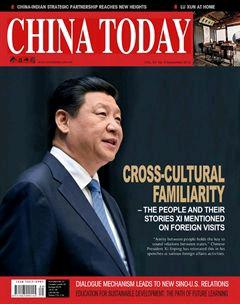Leisure in China
By+SEBASTIEN+ROUSSILLAT
New arrivals in China often get the impression that Chinese are 工作狂 (gōng zuò kuáng), workaholics. Yet, there is quite a bit of 空闲 (kòng xián), leisure, in China.
Surprisingly, the Chinese love to 休闲 (xiū xián), relax, perhaps even more than we do. They love to spend their time 养花 (yǎng huā), tending flowers, 养鸟 (yǎng niǎo), raising birds, or even 养蛐蛐儿 (yǎng qū qur), keeping crickets. Chinese people are also fond of 休闲活动 (xiū xián huó dòng), leisure games, notably 麻将 (má jiàng), mahjong, whose pronunciation comes directly from the Chinese. The Chinese also love to 打牌 (dǎ pái), play cards to 打发时间 (dǎ fa shí jiān), pass the time, a national sport which is almost as widespread as petanque in France.
The Chinese have a well-developed vocabulary for 闲 (xián), idleness, including more than 20 expressions which include the character. Among these the most interesting are 闲谈 (xián tán), gossiping or chitchat – always an art – and also 闲逛 (xián guàng), to stroll, and 闲书 (xián shū), a light or entertaining read. Finally the person who does all these things is definitely a 闲人 (xián rén), idler.
One might admit to being an idler and say he or she is 很闲(hěn xián), quite idle, or 闲死了 (xián sǐ le), bored to death. For busy people, they should 偷闲 (tōu xián), make some free time. Chinese at work often say that they need to 忙里偷闲 (máng lǐtōu xián), steal some time from work.
Leisure and relaxation are a big part of Chinese culture, and the number of words to express this system of thought – which dates back to antiquity – is staggering.
Taoism advocates that people 修身 (xiū shēn), cultivate moral character, in 清闲 (qīng xián), relaxation, and 安贫乐道 (ān pín lè dào), be happy to lead a simple and virtuous life. This explains why Chinese are so deeply steeped in the tradition of enjoying 悠哉的生活 (yōu zāi de shēng huó), free and leisurely life. This recalls the title of famous Chinese writer Lin Yutangs book 生活的艺术 (shēng huó de yì shù), The Importance of Living. The author speaks at length of the Chinese peoples capacity to 吐闲(tǔ xián), make time for life and to 享受生活 (xiǎng shòu shēng huó), relish living.
Leisure means attaining a state of 身心舒畅 (shēn xīn shūchàng), spiritual and physical happiness, which permits one to have a 神清气爽的 (shén qīng qì shuǎng de) refreshing spirit. The ultimate goal is to achieve a state of逍遥自在 (xiāo yáo zì zài), being carefree and enjoying life. Chinese poets like Li Bai or Su Shi wrote poems praising an easy lifestyle, but the ones who struck closest to the mark were Tao Yuanming (365-427). Tao Yuanming set a foundation for a 生活方式 (shēng huó fāng shì), way of life, which emphasizes a balanced country life. In a sense both earthy and spiritual, it has given us the expression 悠然自得 (yōu rán zì dé), to be relaxed and well.
I hope that in your 百忙之中 (bǎi máng zhī zhōng), busy life, this little 闲谈 (xián tán), chitchat, reminds you to rest a little and make room for free time. It is only when things are empty that they can be filled. Having a life too full is not a sign of wisdom in China.endprint

